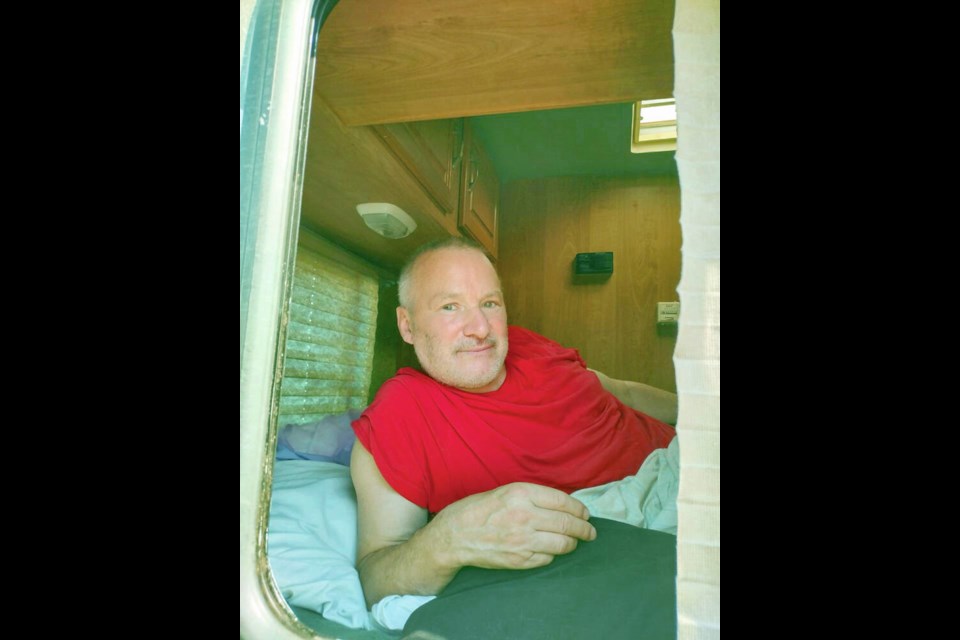Gerald Lee was in his recreational vehicle — which doubles as his home — at 4:30 a.m. when the quiet was shattered by a rock thrown at his windshield.
It cost Lee, 63, who relies on disability support, $440 to fix the smashed front windshield.
Lee, who was parked on a street in downtown Duncan at the time of the June 30 incident, is part of a growing community of unhoused people who live in their RVs because they have nowhere else to live.
“It’s really hard,” he said.
This past week, he has parked near the highway close to a fast-food outlet where he counted on lights and security cameras to protect his vehicle.
Lee and others living in their RVs are among the many casualties of the ongoing lack of affordable housing in the region, compounded by increased costs at RV campsites.
It may be a step up from living in a tent, but life for those who call RVs home is not easy, said Keith Simmonds, minister at Duncan United Church.
They face bans on overnight parking, tickets from municipal bylaw officers responding to complaints, residents who don’t want them in their neighbourhoods, constant relocation, rising costs of fuel, and the worry of possible expensive repairs, he said.
Simmonds wrote to Duncan council in April asking if a way could be found to allow RVs to stay overnight on local parking lots. The community has public and private lots that could be used, he said — including the church’s own lot on Ingram Street, which has parking for 22 vehicles.
“Can we come up with some kind of regular regulatory regime that supports and protects people?” he said.
In his letter, he noted that current bylaws do not allow people to live in RVs unless they’re parked at “overfull and costly RV parks,” which is a hardship for many.
Parking lots, including the church’s, are being sought out as overnight resting places by folks with no other housing options, he said.
Even if the church received permission to fill its 22 spots, he figures the demand in Duncan would amount to triple that number.
Some of those living in RVs hold down jobs, while others are living on disability benefits. If someone on social assistance lives in an RV, their housing allowance is clawed back because they are not in an apartment, Simmonds said.
Those who live in their RVs often drive around looking for places to park, whether in rural areas or on residential streets. If someone complains, bylaw enforcement turns up, he said.
Simmonds said it is up to senior governments to provide affordable housing, noting that people are housed during emergencies, such as wildfires, around the province.
Duncan staff are preparing a report on the issue for Duncan and North Cowichan’s next joint meeting, which North Cowichan Mayor Al Siebring expects to take place after the Oct. 15 municipal elections.
“We have seen more [people living in RVs] in the last few years,” said Siebring, who isn’t seeking re-election. “It is part of the housing crisis reality.”
One issue the municipalities will have to consider is how to dispose of septic waste and garbage, he said.
While North Cowichan doesn’t want people living in RVs on municipal streets — or even on properties that aren’t zoned as campsites — the municipality understands the situation some people without homes are facing, Siebring said. “We are not doing a whole lot of enforcement.”
Bylaw enforcement is complaint-driven, he said — if someone stays in an RV for three or four nights and neighbours call the municipality to complain, they will get a visit from a bylaw officer.
Generally, bylaw officers do not write tickets, he said. “We will just sort of gently move them along.”
Siebring noted that there is designated RV parking in Chemainus where some people have probably been staying for longer than three or four nights without complaints during the colder months.
But in summer tourist season, merchants want the area to be for tourists, Siebring said.
>>> To comment on this article, write a letter to the editor: [email protected]




